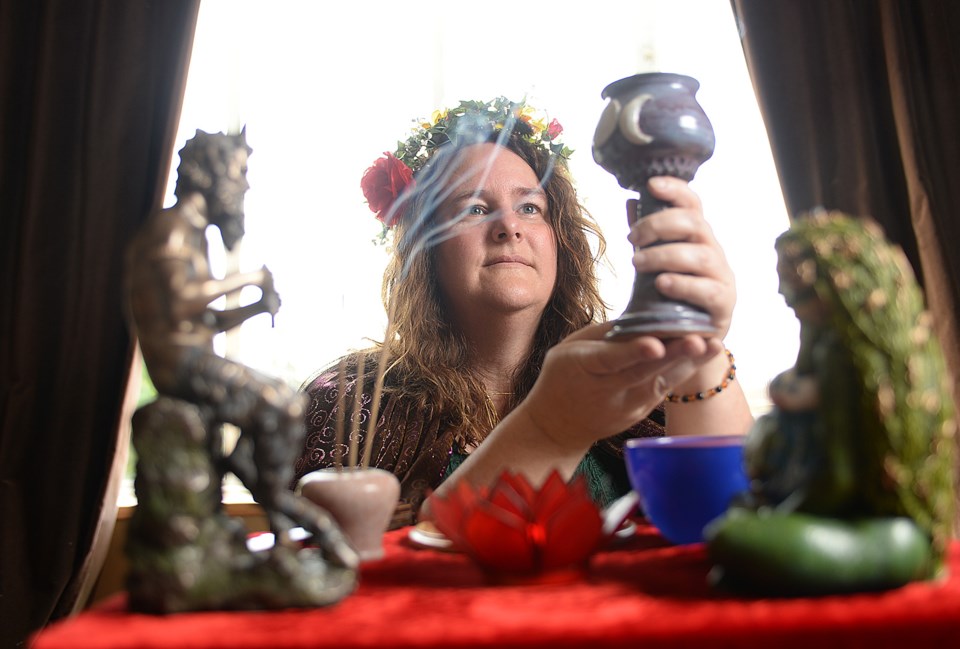It’s been a long, wet spring — nothing unusual for this part of the world. A little nice weather and we’re all in a summery mood. Especially the local Wiccans, who yesterday celebrated Beltane, marking the advent of summer and the time when livestock were traditionally turned out to graze.
There’s still a lot of confusion about Wicca, albeit not as much as in the past, says Wendy Avis, a Vancouver woman who has been practising the tradition for two decades. For reasons inexplicable, but probably due to prejudices of the dominant religion, Wicca, and the broader umbrella of paganism, were conflated in the public imagination with devil worship. (Paganism is an umbrella term for believers in Earth-based deities; Wicca is more specifically aligned with European gods.)
Wicca, says Avis, is simply an Earth-based religion that centres around the “turning of the wheel” — the progress of the calendar and the comings and goings of the seasons. In practical terms, Wiccans have a deeply spiritual affiliation with the Earth. For Avis, who discovered Wicca about the time she was doing graduate work in environmental studies at UBC, sacred and ordinary are inherently entwined.
“It is a connection for me to the land and to the sacred Earth, a reminder that I am interdependent on the planet,” she says. “The things that I do day-to-day affect the planet and the planet affects me, so it affects my lifestyle. Concrete things are like buying organic and being aware of my transportation choices to address climate change and daily lifestyle choices that I make are reminders that I’m a part of this planet. If I think of the planet as Mother Earth, we need to take care of her and we are part of her.”
Confusion exists also around the roots of Wicca. Avis considers it a “new” religion. While the most famous pagans may have been the druids of Stonehenge fame, the fact is we know little about the religious practices of pre-Christian Europeans. Today’s Wiccans don’t trace their direct lineage much before the 1970s, at least Avis doesn’t.
“I see myself as a neopagan,” Avis says. “It’s new, with ideas of what we know of how people practised pre-Christian. A lot of it is English or European folk ideas about how people practice but it’s very much our interpretation of it in terms of what we know and understand but also adapted for modern life. We have to change and be dynamic with the realities of our lives.”
Wicca is a polytheistic amalgam of various European traditions, including Celtic, Roman and Greek, reviving gods of the past. But at root it is about the Earth, not the heavens, about what is beneath our feet more than what is above our heads. It became comparatively big in the U.K. in the mid-20th century and spread, understandably, to California before coming north. Canada’s census records Wiccans and in 2011, there were about 25,000 pagans, of which about 10,000 identified as Wiccans. Avis suggests there may be more who didn’t tick the box.
Since there is no Wiccan pope and no hard and fast rules for practising the tradition, each circle of practitioners is pretty much free to find what works for them. For Avis and her circle of a dozen or so fellow Wiccans, that means heading to a farm on the eight major celebrations in the year for outdoor rituals like jumping over a bonfire as a symbol of purification, for example, and the invocation of the four elements and the four directions. One of the things that has been reliably passed down through the millennia is the maypole, a symbol of fertility for flora and fauna, including humans.
Wiccans meet in homes for more intimate get-togethers that feature spiritual exploration and personal work. The big festivities attract a few dozen extras — family and friends who come for the celebration, dancing, singing, drumming and feasting. Overseeing the whole thing is usually a high priest and high priestess, reflecting Wicca’s holistic attitude to gender, which extends to the celebration of the feminine and masculine in each person.
And while Wicca is polytheistic, it is counterintuitively monotheistic. Avis explains: “The general belief within the community is that all gods are one god and are part of the sacred creator or the sacred divine.”
Yesterday’s Beltane celebration, Avis says, was about “the reawakening of the Earth and the celebration of the coming return of summer.”
pat604johnson@gmail.com



